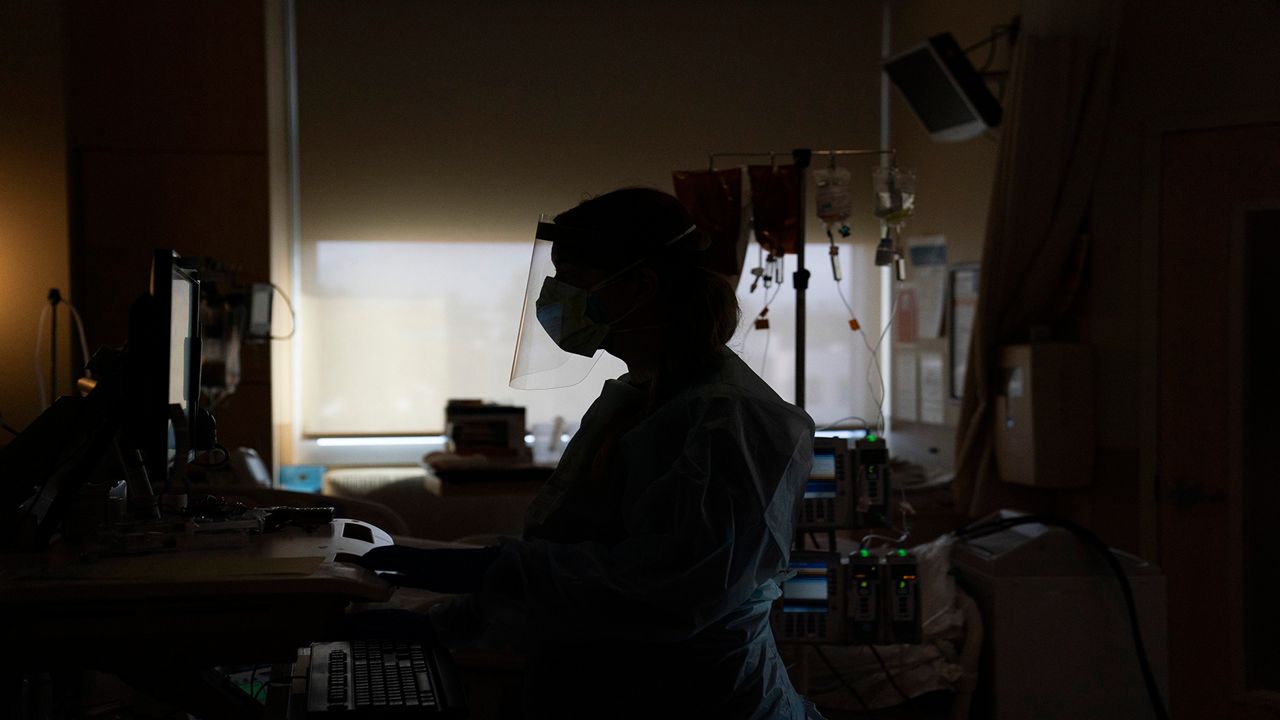OHIO — “We’re no longer the front lines,” said Dara Pence, the ICU nurse manager at Riverside Hospital in Columbus. “We’re the last line of defense. The front line now is the community.”
Pence along with other health care workers joined Gov. Mike DeWine's press conference Monday, pleading residents to take the virus seriously as hospitals become overwhelmed.
It was another record-breaking day for Ohio as the state reported grim numbers coming from the state's hospitals.
More than 5,000 patients are hospitalized, 1,160 are in ICUs, and 682 on ventilators, which are all-time highs, according to the Ohio Department of Health.
For weeks, hospital leaders have been calling on Ohioans to take the virus seriously as ICU and inpatient bed availability rapidly declines. At some hospitals in southern Ohio, the number of COVID-19 patients is starting to outweigh the number of patients without the virus.
The top challenges for hospitals is having enough supplies, like ventilators, and enough staff to keep treating patients. Over the past month, hospital systems like the Cleveland Clinic, University Hospitals and MetroHealth Systems have reported record numbers of health care workers either out sick with COVID-19 or in quarantine.
Because of the staff shortages, health care workers say they are overwhelmed, and they're once again trying to get a message across to residents throughout the state.
"I understand how some can feel this is fake or blown out of proportion. It feels safe where you are. Because you have not really seen it. I see it. My team sees it. We have been battling it for months. We were so hopeful a couple months ago as the number of hospitalizations began to dip and things reopened. We hoped so badly, just like you, that it was going to get better and stay better. But this past week came at us like a semi truck," said Stacey Morris, the interim nurse manager at Akron General, in a Facebook post.
Morris joined Pence and many other health care workers at the press conference Monday. She said what has surprised her is how quickly the virus can deteriorate someone's health at any age.
“We’ve had people in their 30s and 40s with no medical history who do really poorly with this," Morris said. She noted that the virus is so unpredictable that the staff can't tell who will pull through and who won't.
As more and more hospitals begin to reach max capacity, others are getting short on supplies.
Dr. Andy Thomas, chief clinical officer at Ohio State University’s Wexner Medical Center, said many hospitals have had to loan ventilators to others across the state. He noted one rural hospital, but didn't name which one, had to operate at 130% above capacity in its ICU.
“They ran low on ventilators in a relatively quick fashion,” Thomas said. “It’s a significant issue that we’re concerned about, with ICU capacity as the total numbers grow."
Health care workers warn a continued surge of cases could overwhelm hospitals jeopardizing the quality of care for all patients. In rural areas as many as 50% of the people who are on a ventilator or in the ICU have COVID-19, officials said.
"Those are the numbers that everyone should watch. Those beds are where the treatment can be accessed. Not just COVID treatment, all treatment. We must triage our space very carefully. Please remember, we need our beds for other things. Cancer treatment, surgeries, stroke, heart attack.....the list goes on and on," Morris wrote in her Facebook post.
Jamie Giere, the COVID-19 unit team leader at Premier Health in Troy, said what hospitals thought they knew about the virus back in March has completely changed.
“We’re seeing healthy, healthy individuals come in, and they decline so quickly,” Giere said. “I feel like back in March, it was the elderly population. I feel like now the COVID population has been getting younger and younger.”
Adults between the ages of 18 to 34 who have been hospitalized with the virus are seeing some of the most serious side effects after recovering, according to a recent study by JAMA Network. COVID-19 deaths for ages below 1 year old to 24 years old have also been increasing, according to the Centers for Disease Control and Prevention.
As deaths continue to increase statewide, one hospital's morgue had been overwhelmed to the point a refrigerator truck to store bodies was ordered. Thomas didn't identify which hospital, but said it's in the northern part of the state.
Pence said she wishes that the communities could witness what health care workers are going through, but noted she would never want them to see what nurses and doctors see on a daily basis. Long after the pandemic, Pence believes health care workers across the world will develop post-traumatic stress disorder.
"Our team is strong, but everybody is only so strong for so long," Pence said.
Morris echoed Pence's concerns both at the press conference and on Facebook, saying it's time for the community to start stepping up.
"I cried with my team yesterday," Morris wrote. "I cried because we take people to ICU everyday. We watch them take their last breath. I cried because I know they are tired and as their leader I cannot take that exhausted feeling away. Regardless of your thoughts on the virus, if you need a bed we will be there if you need us. My team will provide you or your loved one the most amazing care you have ever seen in the face of this pandemic."
Morris added that she's had many patients tell her that they didn't believe it was real or that it could be as bad as it is.
"We are living it. We see it. It is real."



